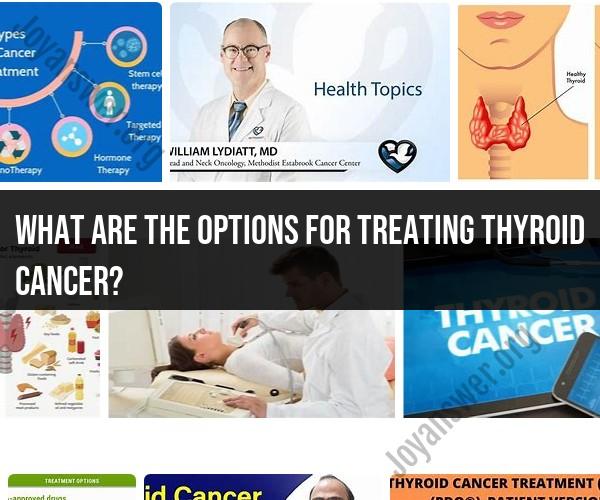What are the options for treating thyroid cancer?
Treatment options for thyroid cancer depend on several factors, including the type and stage of thyroid cancer, the patient's overall health, and individual preferences. The main treatment options for thyroid cancer include:
Surgery:
- Thyroidectomy: The most common treatment for thyroid cancer is the surgical removal of all or part of the thyroid gland. The extent of the surgery depends on factors such as the size of the tumor and whether cancer has spread to nearby lymph nodes.
- Lymph Node Dissection: In cases where cancer has spread to nearby lymph nodes, the surgeon may also remove affected lymph nodes during the thyroidectomy.
Radioactive Iodine (RAI) Therapy:
- After surgery, some patients may receive radioactive iodine therapy. Radioactive iodine is taken orally and is absorbed by any remaining thyroid tissue, as well as any thyroid cancer cells that may have spread to other parts of the body. This helps destroy any remaining cancer cells.
Thyroid Hormone Replacement Therapy:
- After thyroid surgery, patients typically need to take thyroid hormone replacement medication (e.g., levothyroxine) to replace the missing thyroid hormones. This medication helps regulate metabolism and prevents hypothyroidism.
External Beam Radiation Therapy (EBRT):
- In cases where thyroid cancer is more advanced or has not responded to other treatments, external beam radiation therapy may be used. This involves targeted radiation to the affected area.
Chemotherapy:
- Chemotherapy is not typically the first-line treatment for thyroid cancer but may be used in certain cases, such as anaplastic thyroid cancer or when other treatments have been unsuccessful.
Targeted Therapy:
- Targeted therapy drugs, such as tyrosine kinase inhibitors, may be used for advanced or metastatic thyroid cancer. These medications target specific molecules involved in cancer growth and spread.
Immunotherapy:
- Immunotherapy drugs, such as immune checkpoint inhibitors, are being explored in clinical trials for the treatment of advanced thyroid cancer. They work by enhancing the body's immune response against cancer cells.
The choice of treatment depends on factors like the type of thyroid cancer (e.g., papillary, follicular, medullary, anaplastic), the stage of cancer (I, II, III, IV), whether it has spread to lymph nodes or distant organs, and the patient's overall health.
In many cases, surgery is the primary treatment, followed by radioactive iodine therapy to destroy any remaining thyroid tissue or cancer cells. Thyroid hormone replacement therapy is usually lifelong to maintain normal hormone levels.
It's essential for patients with thyroid cancer to work closely with a team of healthcare professionals, including surgeons, endocrinologists, oncologists, and radiation oncologists, to develop an individualized treatment plan. Regular follow-up and monitoring are crucial to detect any recurrence or changes in thyroid cancer status. Additionally, patients should discuss potential side effects, risks, and benefits of each treatment option with their healthcare team to make informed decisions about their care.
There are a number of different treatment options for thyroid cancer, depending on the type and stage of the cancer. The most common treatments include:
- Surgery: Surgery is the most common treatment for thyroid cancer. The goal of surgery is to remove the entire thyroid gland, or as much of the thyroid gland as possible.
- Radioactive iodine therapy: Radioactive iodine therapy is a treatment that uses radioactive iodine to destroy any remaining thyroid cancer cells after surgery.
- Thyroid hormone therapy: Thyroid hormone therapy is a treatment that involves taking a synthetic thyroid hormone medication to replace the thyroid hormone that the body is no longer producing after surgery or radioactive iodine therapy.
- External beam radiation therapy: External beam radiation therapy is a treatment that uses high-energy beams of radiation to kill cancer cells. It is not commonly used as a primary treatment for thyroid cancer, but it may be used after surgery or radioactive iodine therapy to destroy any remaining cancer cells.
- Targeted therapy: Targeted therapy is a type of cancer treatment that targets specific molecules that are involved in the growth and survival of cancer cells. Targeted therapy medications may be used to treat thyroid cancer that has spread to other parts of the body or that is not responding to other treatments.
The best treatment option for you will depend on the type and stage of your thyroid cancer, as well as your overall health and preferences. Your doctor will work with you to develop a treatment plan that is right for you.
Here are some additional things to keep in mind about thyroid cancer treatment:
- Thyroid cancer is a very treatable cancer. The 5-year survival rate for people with thyroid cancer is over 98%.
- Treatment for thyroid cancer can cause side effects, such as fatigue, hoarseness, and hair loss. However, most side effects are mild and temporary.
- It is important to follow your doctor's instructions carefully and to attend all of your follow-up appointments. This will help to ensure that your treatment is effective and that you are recovering well.
If you have any questions about thyroid cancer treatment, be sure to talk to your doctor. They can help you understand your options and choose the best treatment plan for you.













